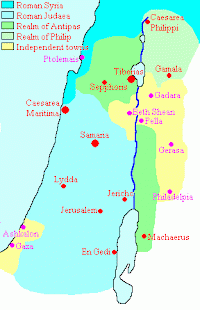Pontius Pilate (2)
Pontius Pilate: Roman prefect of Judaea from 26 CE to 36 CE, best known for the execution of Jesus of Nazareth.
Tasks of a governor

The governor of any Roman province had four tasks.
- He was responsible for the taxes. As the emperor's personal financial agent, he had to supervise the local authorities and the private tax collectors (the notorious publicans). To facilitate things, a governor might mint coins and negotiate with wealthy institutions (like the Temple in Jerusalem) that could advance the money.
- He was an accountant: he inspected the books and supervised large scale building projects.
- The governor was the province's supreme judge. Appeal was not impossible, but the voyage to Rome was expensive. The Judaean governor was supposed to travel through the three main districts - Samaria, Judaea and Idumea - to administer justice in the assize towns.
- He commanded an army. In the more important provinces, this could consist of legions; but the Judaean governor commanded only auxiliary troops. Two cohorts had their barracks in Jerusalem (in the old palace and in the fortress Antonia); a third cohort guarded the Judaean capital, Caesarea; and two cohorts of infantry and one cavalry regiment were on duty throughout the province. Taken together, the prefect commanded 6×500 men: a force to be reckoned with, but not enough when things went seriously wrong. In that case, his superior, the governor of Syria, would have to send a legion, a heavy infantry unit of 5300 men.
These were the governor's normal tasks. Pilate's tenure of office was not typical, however, because the Syrian governor Lucius Aelius Lamia was absent. This lively old man - a personal friend of the famous poet Horace - belonged to the highest nobility of the Empire: he had been consul in 3 CE and governor of the prestigious province of Africa in 15/16. For unknown reasons, the emperor Tiberius requested the popular senator to remain in Rome even though he was governor of Syria, and when Lamia died in 33, the emperor ordered a state funeral. To Pilate, this meant that for the first six years of his term of office, he could not fall back on the Syrian governor and his troops. In case of an emergency, he and his auxiliaries were alone.